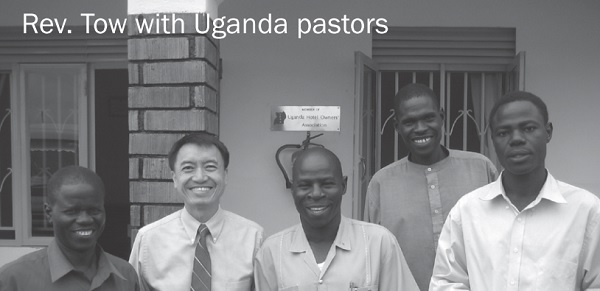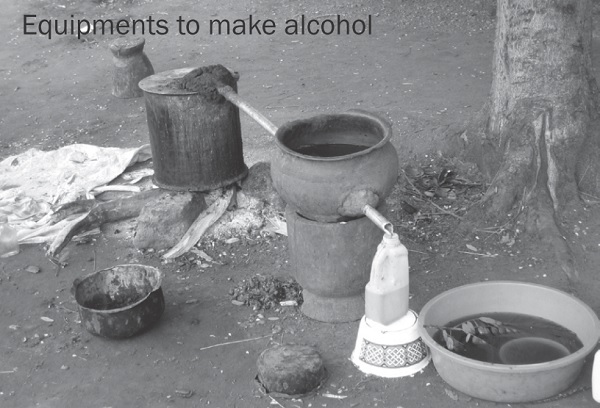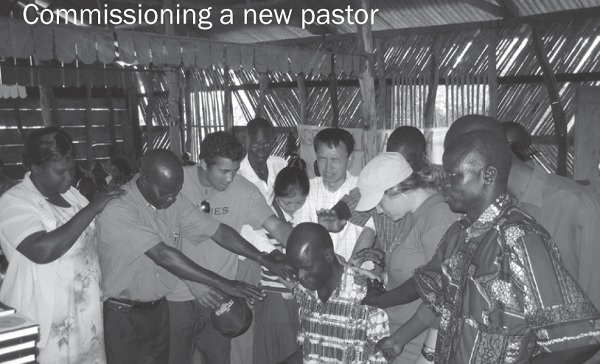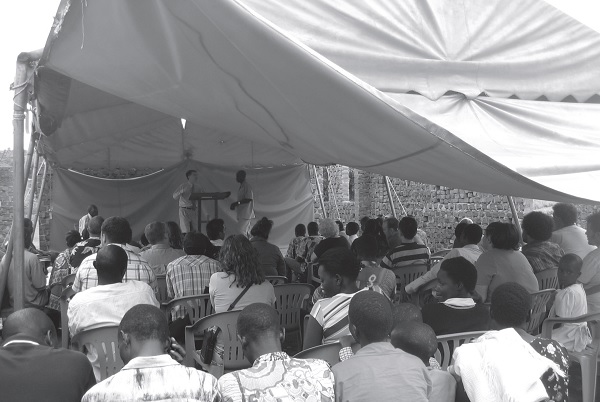Let the True Light Shine on Uganda
By Joyce Yue, M.D.

Interviewing Rev. Fred Tow
Rev. Tow is the English pastor of the Houston Chinese Church who led a mission team to Uganda twice. He graciously allowed me to interview him and share his experience with our readers.
1. Your church has been involved with sending short-term missionaries to Africa for some time now. What is the history of that program?
Historically, our church has focused a lot of missions activity in Southeast Asia. It was my desire to broaden our efforts in other parts of the world. At the same time, the Lord placed upon my heart to do missionary work in Africa. That led me to organize a team of 8 persons to go to Africa with e3 Partners, a missions organization based in Africa. Prior to that, a few of our church members felt led to go on a missions trip to Africa, also with e3 Partners. In additional, we have had several of our medical students do rotations in various parts of Africa, primarily through their school programs.

2. How did you become involved in this program?
I had not gone on a mission trip for a number of years, and our outreach minister encouraged me to take a team on a mission trip. I began praying about where to go, and what type of experience I would like to gain. I wanted to go to a poor country, a country that has experienced much suffering, a country that has AIDS; I also wanted God to break my heart for poor and suffering people, to open my eyes to their needs and to bring hope to them through the Good News of Jesus Christ. The Lord placed Africa on my heart. I chose to go to Uganda because I wanted to go to an English-speaking country, where I could have more freedom in communicating.
I have several pastor friends that had gone with e3 Partners and had positive experiences. I was impressed with their vision and strategy in working with local churches in the mission field. e3 stands for Evangelizing, Equipping, and Establishing, where the ultimate goal is to Evangelize through Equipping the local Christians and to Establish new church plants. Our purpose, as Americans, was to train the local African Christians to do evangelism and follow-up, so that they would not be dependent on the missionaries after their departure. The local African churches were also responsible for training pastors to oversee the new church plants. In this way, the new pastors would have ongoing support from the mother church. The local church also mobilized people from their churches to be trained by the Americans to do evangelism and discipleship. It was a biblical, sound philosophy of ministering to the Africans, which was local church-based, and not dependent on missionary presence.
3. How did your team prepare before this mission trip?
The mission board had three training sessions, helping us understand the culture and how best to share the good news with them. There were tools to help us share our testimonies and present the Gospel using the Evangecube – the gospel in pictures on a cube. They also counseled us on logistics, such as immunizations, passports, etc. Our team also met on our own to build comradery, to pray, and practice our testimonies and gospel presentations.

4. What was a typical day for you during your missions in Uganda?
The team that ministered in Uganda consisted of 35 people from different churches across the US. Our goal was to establish seven churches. We were divided into seven teams and partnered with nationals to train them to do evangelism. Our seven teams spread out into different locations. Since the normal mode of transportation is by walking, our goal was to plant a church within 15 minutes of walking distance to most of the people in that location. Often the church would be at an outdoor location, e.g. under the Mango tree – the Mango Tree Church. The day began with our American team meeting together for worship, prayer, devotion, and instruction. Then we would go by bus or van to meet our Ugandan team members in the villages, and we would go hut to hut to share the good news.
A typical scenario was that we would approach a few people who were outside cooking, or watching the children. We would explain that we wanted to share with them. Usually, the villagers would go get other people in the immediate area, and they would go inside their huts to bring out mats for us to sit on, or an occasional wooden chair. They would sit in large groups to listen to the gospel presentation, and praise the Lord, many responded to trust Jesus as their personal Savior.
The people were primarily women and children, or older men. They were receptive to the gospel, and through the efforts of the Americans and Ugandans, 926 people made professions of faith, and 7 churches were planted.
The evangelistic activities took place during the morning. After a brief lunch, which might consist of crackers and water, we would prepare for the afternoon discipleship lessons. The new converts were invited back to convene at the location of the church to be planted, for example, under the mango tree. There, the new pastor of that new local congregation would distribute discipleship lessons and lead them.

5. What are some obstacles that hinder the spreading of the gospel in Africa?
There were three hindrances to our ministry:
• People are very superstitious – witch doctors are very influential in the villages. Evil spirits are very active in Africa – demon possession – these are not common in America.
• It is a polygamous society and men are resistant to the gospel because they feel that they would need to give up their wives.
• Poverty – we met people who made alcohol on the side to bring in income, and they feared the loss of this income.
6. What memorable moments did you have in Uganda where you strongly felt God’s presence with you?
On my first trip to Uganda, I had the privilege of preaching in one of the established local churches. I was able to enjoy their rousing, spirited worship, and had my sermon translated into Alur, the local language.
One unforgettable incident happened during our visit to the villages. As I and my Ugandan partner and his wife were crossing a clearing, an angry man burst from the nearby hut and threatened us, alleging that we had trespassed, and that we were spying on their secret ceremony. This man was the village chief and a witch doctor. He placed us under “arrest”. They held us for over three hours, and during that time, we witnessed cultic dancing and a goat sacrifice, with the goat’s blood being dabbed on the tongues of the participating men. We were befriended by the witch doctor’s cousin, who invited us into his hut to rest, and we were able to have some good conversations, and even to encourage him in his backslidden faith. At the end of this time, one of the local pastors came with the police chief, and we were released. Later, one of the local pastors was emboldened by the Lord to share the gospel with the witch doctor!
7. What have you learned from your missions trip?
God is a powerful God – that He just requires our availability, and He is the One who convicts souls, casts out demons, and performs miracles that only HE could do, so that the Gospel can be proclaimed.
I learned about the beauty of the body of Christ, as we came from a wide range of denominations, ages, socio-economic status, ethnicities, and were able to work alongside the nationals to do evangelism. This was a wonderful bonding time – we have Jesus Christ in common.
My two trips to Uganda have also opened my eyes to so many people that are so poor, and how rich we are in comparison. To a certain degree, the Africans are more content with what little they have, than Americans are, with so much more.
Finally, I saw the Uganda Christians worship God passionately with all of their heart, soul, and mind.
8. In case our readers are interested in doing missions in Africa, what advice do you have for them?
God knows what we can handle. Fears are different for different folks, examples of which are primitive living conditions, heat, bugs, ability to connect with a different culture, safety, sanitation, ability to train tribal people, demon possession. God gives us different challenges – and grace to go through those difficulties
GO – God will stretch your faith – He just asks for availability.
9. Please give us some background (religion, culture, politics, and economics) on Uganda.
The region is fertile with good soil and three annual growing seasons. The main export crop is coffee. More than 80% of the population is in agriculture. The economy was healthy in the 1960s, but this was damaged with the expulsion of the Asian business community in 1972, followed by tyranny and warfare. There has been a slow, but steady improvement since 1992, but continuing warfare and AIDS and other diseases keeps most of the population in deep poverty. The estimated per capita income in 2008 was $1100.
Uganda gained its independence from Britain in 1962. In 1986 Yoweri Museveni gained power, and he continues today as Chief of State and head of the government. Elections occur every five years without term limits.
In the year 2008, there were over 32 million people in Uganda, of which 13% live in urban areas. The median age is 15 years old. In the 1990’s about 18% of the population had HIV; by 2007, that had declined to 5%.
The country has 4 major ethnic divisions, the largest of which is the Bantu with 64.8%. The official language is English, with 67% literacy. In the rural villages where English was limited, foreigners need translators.
Over 80% of the people claim to be Christians – there is freedom of religion, but most of the Christians are nominal; only 7% of these Christians are truly born-again. In the 2002 census, 41.9% were Roman Catholic, 35.9% were Anglican. In the villages, where animism and witch doctor activity were common, where there is no electricity or running water, most of the people are farmers or fishermen; unemployment is high and people are just trying to survive off the land. The government provides education through elementary school; after that, the school fees are prohibitive for most families.
Culturally it is a male-dominated society. Women have a second-class status. Polygamy is common, sexual promiscuity is rampant. Families and extended families live in the same village. Families are quite large, and consequently we saw many young children watching younger children. Generally, the children were much better behaved than American children. A group of 50 children would gather for a program and sit quietly, submitting well to adult authority. They were a hospitable people, especially toward guests, sharing their best. Witch doctors have a prominent place in the villages.


 After serving in Houston Chinese Church for a year, Joyce Yue helped design and edit She360, HCC’s publication for women. She is now a pediatrician in Sugar Land, a suburb of Houston, TX. In her spare time, she enjoys writing, cooking, traveling, and photography.
After serving in Houston Chinese Church for a year, Joyce Yue helped design and edit She360, HCC’s publication for women. She is now a pediatrician in Sugar Land, a suburb of Houston, TX. In her spare time, she enjoys writing, cooking, traveling, and photography.